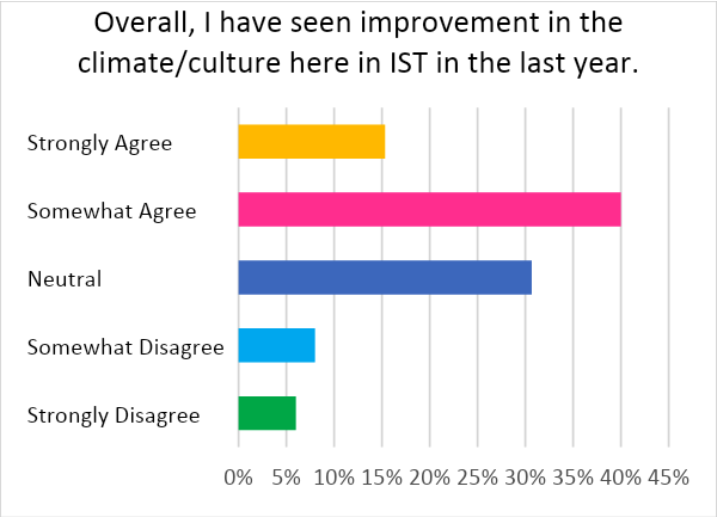CASE STUDY
Turning Around a Damaged Culture
and Wounded Workforce
PROBLEM: Public Allegations of Discrimination & A Need to Understand Its Pervasiveness
At the height of the #MeToo movement, several women from UC Berkeley’s Information Services and Technology (IST) Dept came forward with complaints of alleged discrimination and a hostile work environment. They felt the HR Dept had treated them unjustly, and they were open about their unhappiness with departmental leadership.
Interested in understanding the organizational climate, the prevalence of harassment and discrimination, and what they needed to do in order to replace these behaviors with equity, the Chief Information Officer and his Chief of Staff sought assistance from Civility Partners.
SOLUTION – Part 1: A Climate Assessment
After interviewing the department’s directors to understand what information we should focus on uncovering, Civility Partners created a survey for the IST Dept and deployed it to the entire department of over 300 people. We also interviewed a random selection of 10% of the workforce to gain valuable insight about the organization.
The survey results showed positive relationships between staff members, much respect for the skills and abilities of peers, and a high level of job satisfaction.
Opportunities for improvement included building channels for employees to feel heard, more transparency, better performance management processes, and a more positive and inclusive work culture.
Statistical analysis also revealed that women and Blacks/African Americans perceived the organization to be less fair, and they were also less engaged.
Through the interview process we discovered that the workforce was very hurt by the rumors of discrimination circulating in the media, as well as their own experiences. Further, many interviewees believed harassment, bullying and discrimination to be pervasive.
Civility Partners presented the results at an all-staff meeting and recruited a team of 11 employees to take lead in making change at IST.


SOLUTION – Part 2: The Action Team
Civility Partners and the action team crafted a strategic plan for culture change. The plan included six objectives, each with two or three goals. Examples include:
Objective: Build trust in the process of change
- Goal: Give employees opportunities to heal
- Goal: Increase transparency in communication
Objective: Build empathy, civility and respect into everyday behavior
- Goal: Increase empathy and multicultural/diversity awareness
Objective: Provide career development opportunities for everyone
- Goal: Adjust performance management system to be equitable and fair
- Goal: Ensure diversity in hiring, promotional opportunities, and training opportunities
Examples of some of our work with IST included:
- Roll out of a core competency matrix tied to UC Berkeley’s core values, which held all levels of the organization accountable for creating a positive and safe environment.
- A list of 40+ job boards tailored towards a more diverse population of candidates.
- New interview questions that explore candidate’s experiences and skill in creating inclusive teams.
- More transparency and communication through a “Coffee with the CIO” program, quarterly all-staff meetings, frequent skip-level meetings with Directors and employees, and published guidelines for participation in IST’s leadership program.
- Ongoing work with the leadership team to provide guidance in overcoming challenges.
IST also hired a new HR Business Partner who focused on re-building trust in HR, developing personal relationships with employees, and stepping in to resolve complaints when received. In addition, the CIO, Chief of Staff, and Directors made culture and inclusivity a main focus of everything they did.
SOLUTION – Part 3: Training
Civility Partners also conducted two important training programs:
- Bystander/ally training for all employees
Training evaluations averaged 4.2 out of 5. When a pulse survey was conducted a few months later, 41% of respondents indicated they had used the knowledge gained in the training to stand up for a colleague. This training also expanded into an “I’ve got your back” program put together by the action team. To expand the learning, one member began holding workshops for employees to discuss and practices scenarios.
- Coaching and conflict resolution training for supervisors, managers and leaders.
Training evaluations averaged 4.2 out of 5 and the skills presented were tied to core competencies.

Key Results: Improved Survey Scores and the Tools to Continue Rebuilding Culture
Civility Partners conducted a second survey 15 months after the first, and found marked improvement.
For example, 55% of respondents agreed or strongly agreed that they’ve seen improvement in the last year.
Perceptions of the organization’s commitment to diversity had increased. All ethnicities believed the strategies leaders, managers and supervisors were using to build relationships had improved, including abilities to take in complaints, resolve negative behavior, and be more transparent. In addition, IST employees were more engaged and more satisfied with their jobs than in the previous survey.
As the graph below indicates, in 2018 Blacks/African Americans scored the organization differently in all areas. They perceived more harassment due to gender and ethnicity, more bullying, less focus from leaders on relationships and a commitment to diversity, and were less engaged and less satisfied with their jobs.
In 2019, Blacks/African Americans perceptions of the organization had increased dramatically. This group scored similarly in perceptions of harassment and bullying, and engagement and job satisfaction. Though the organization still had a lot of work to do, as they rated the organization’s commitment to diversity as a 3, while other groups rated this area as a 3.5 or above.

The gap between women and men had also evened out significantly. In 2018, on a scale of 1 to 5 (1=never; 5=daily) women rated the frequency of bullying as 4, or occurring weekly. Men rated the frequency of bullying as 2.5, occurring somewhere between sometimes and monthly.
In 2019, women’s ratings had dropped dramatically from 4 to 1.8, and men from 2.5 to 1.8.

Overall, the organization had much improvement in their survey scores, but the organization still has much room to grow.
Civility Partners has provided many tools to IST to continue on their journey of repairing the culture, and ultimately building a more inclusive and positive workplace culture.
The leadership team and the action team did an amazing job diving into this huge undertaking, and now that they have processes and tools in place, we are confident they will continue to make vast improvements in the years to come.

